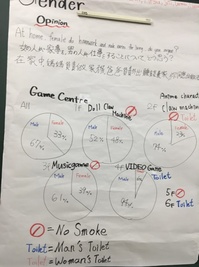【英語版は、日本語版のあとに掲載】大阪香港台湾グローバルシチズンシップ・スタディツアー
“ジェンダー”の視点から世界を捉え直そう
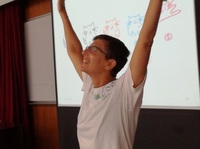
大阪YMCAでは、大阪香港台湾グローバルシチズンシップ・スタディツアーを8月16~21日に実施いたしました。“Celebrate Differences”と題し“というテーマでの国際交流でした。香港14名、台湾5名、大阪9名の中高生が、6日間寝食共に文化・価値観の違いを実感しながらジェンダーを学びました。
3日目の六甲山YMCAではロニー先生と武田寿子さん(元アジア太平洋YMCAジェンダー委員長)を迎えワークショップをしていただきました。“Popoki, what is gender and why is it important?”の内容で、男らしさ女らしさを考えそれを体で表す、また今まで生きてきた人生を川で表し、自らのジェンダーや性について共有しました。抽象的なジェンダーは中高生には大変難しく、またこのスタディツアーが英語中心で進行している中どこまで理解が深まるか私たちも不安でした。でも、ポーポギ(ロニー先生の飼っていた亡き愛猫)が活躍してくれたことで参加者も興味を持ち続けていられました。
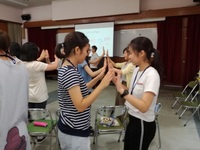
午後は六甲山YMCAでのジェンダー発見のため、施設を歩き回りました。YMCAのキャンプリーダーは圧倒的に女学生が多いこと、ボーイスカウトでは女の子も「ぼく」と発言しているそんな発見をしながら翌日のフィールドワークに備えました。翌日は難波道頓堀周辺で道ゆく人にインタビューしたり、ゲームセンターでジェンダーを発見したり。信号機の表示が男性だったことも新たな気づきでした。これらの発見や気づきは視点が新鮮で、ゲームセンターのクレーンコーナーや音楽ゲームコーナーなど選んだ場所も若者ならではで、大変興味深いものとなりました。ロニー先生が「正解はないから」と言ってくださっていたことを改めて得心しました。国を超えてジェンダーに触れたことはそれぞれの感性を通して、これからの人生に「何か」が残ったことを信じて。
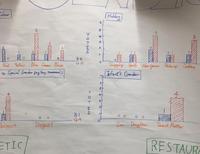
Osaka YMCA held 2017 Global Citizenship Study Tour in Osaka with Hong Kong YMCA & Taiwan YMCA from 16th to 21st August. It aimed to promote cultural exchange with the theme “Celebrate Differences: Let’s Rediscover the World from Gender Perspective.” 28 participants aged from 13 to 19 (14 from Hong Kong, 5 from Taiwan and 9 from Osaka) learned about gender through the six days of partnership filled with awareness to one another’s culture and sense of value.
On the third day we invited Prof. Ronni Alexander and Ms. Toshiko Takeda, the former chairperson of Asia-Pacific YMCA Gender Committee, to Rokko YMCA to hold a workshop. The workshop entitled “Popoki, what is gender and why is it important?” consisted of various unique activities: participants made a statue in groups by using their bodies to represent a word that they thought of for “feminine” or “masculine”; they shared their personal experiences related to gender and sex by putting them in time order within the picture of a river drawn by themselves. I was anxious how well the participants could understand gender as it was an abstract concept and most of the discussions were conducted in English during the workshop. Fortunately, the effective presence of Popoki helped keep participants interested in the topic.
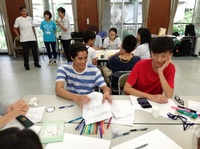
In the afternoon of the day, participants walked around Rokko YMCA to discover gender. They found that the majority of YMCA camp leaders were female and that some female scouts addressed themselves as “boku (a Japanese first-personal pronoun normally used by men).” This activity prepared participants well for the field research at Dotonbori, Namba scheduled the next day. At Dotonbori some groups conducted surveys and interviews with passersby and others observed shops and game centers to discover gender. One of their findings was that the personal images on the traffic lights are male!
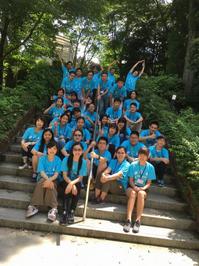
Such finding shows participants’ unique point of view and their choice of research sites such as crane game corners and music game corners in game centers revealed the current interests of young people. Listening to the participants’ findings, I understood why Prof. Ronni said “There are no correct answers.” I am certain that this experience of learning about gender with members of different nationalities has more or less made an impact on each participant’s life.





